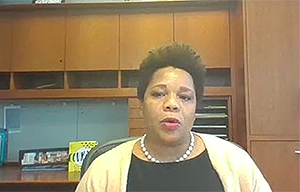Staff Reporter
Trucking Becomes More Focused on Health, Efficiency

[Ensure you have all the info you need in these unprecedented times. Subscribe now.]
Trucking embraced risk management and technology that drives efficiency in response to the coronavirus pandemic, industry leaders said in a panel discussion Jan. 25.
The symposium was part of the SMC³ Jump Start 2021 conference.
“The health risk wasn’t as high up on the list prepandemic as it is now,” XPO Logistics CEO Brad Jacobs said. “There was no emphasis on wipes and on washing hands and not breathing on each other, distancing and paying attention to one’s health. If anybody in the organization is feeling sick or has any symptoms, please stay home. These are all new. These are mainly new in the industry. That’s not going to go back. That’s going to stay.”

Ramona Hood says agility goes beyond technology. (Transport Topics)
FedEx Custom Critical CEO Ramona Hood had just settled into her leadership role when the pandemic hit. A big takeaway she learned was leveraging the business to be more agile in decision-making and in handling data that was coming in quickly.
“The last year for all of us has been quite a year,” Hood said. “There certainly have been things that we’ve learned that we can move forward with into 2021. And one of those things is our ability to respond to what’s going on. Being quick to bring either value or bring decisions forward that allow the business to progress.”
Hood noted that agility goes beyond just technology and can be leveraged in everyday decision-making. The coronavirus brought with it ever-evolving challenges such as shutdown policies. She noted this made agility a necessity.
“When you incorporate business agility into the framework of your strategy and how you move through your initiatives … it brings a new level of value to the organization, your employees, as well as your customers,” Hood said. “It’s a way that you can improve your business and be quick to adapt to any new environment — more quickly than if you thought about it in a traditional annual plan environment.”
Jacobs also went into detail about how the industry has been moving toward getting pricing and probability more precise, particularly in the less-than-truckload space. This includes LTL carriers lowering their operating ratios significantly over the past decade.

Sustainable trucking is here. In this episode, we'll talk to two major players in the transportation technology sector that are helping fleets move closer to total supply chain sustainability. Hear a snippet, above, and get the full program by going to RoadSigns.TTNews.com.
“I think the long-term trend for LTL is to have more profitable operations,” Jacobs said. “I think technology is the underlying motivation of growth in LTL profits and all kinds of different technologies. Technology on [pickup and delivery] optimization.”
Jacobs added having density in LTL helps. He also noted that technology plays a key role by allowing companies to route the trucks in the most efficient and intelligent way. He noted these factors, when done right, can create a big profit uplift. He suspects the rest of the industry will be following what his company has done in that space.
“It may take them a couple of years to do,” Jacobs said. “We’ve taken the smart labor technology, smart labor tools to workforce automation tools, that we have in our contract logistics business that we use in order to staff up our warehouses accurately to match demand. We’ve taken those and applied them to LTL.”
Jacobs added those technologies resulted in a 5% improvement in productivity overall. That process involved using algorithms to predict the amount of freight from customers to staff up accurately.
“The top 10 LTL carriers probably run 20 million miles a day or something like that,” Jacobs said. “As we use more intelligent technology to route those trucks on the highways, we can probably take out a very significant portion of that, like 10% or 15%. I’m not sure what the limit is, could be more than that.”
Jacobs also cited the impact that intelligent technology could have on a company’s bottom line and also the environment.
"The long-term trend for LTL is to have more profitability," and technology is a primary driver for this. - Brad Jacobs at @XPOLogistics gives insight into the future of the industry. #JS2021. Visit https://t.co/7qF1YdflkA to register! — SMC³ (@SMC3_Inc) January 25, 2021
He noted that these technologies will help usher in a better pricing system for customers and indicated such a change will be good for carriers as well because they won’t be overpricing and losing business or underpricing and losing money.
“The pricing system in LTL is archaic,” Jacobs said. “It’s not gonna last. It’s not efficient, and things that aren’t efficient don’t last. It’s surprising it’s lasted this long. Eventually, we’ll sell LTL based on space and on dimensions, because that’s what we have.
“It’s not just on weight and it’s not on these arbitrary classifications, either, that aren’t always accurate. So I think the way freight is priced will be more automated, more done by algorithms. I think it’ll be more accurate.”
Want more news? Listen to today's daily briefing:
Subscribe: Apple Podcasts | Spotify | Amazon Alexa | Google Assistant | More




